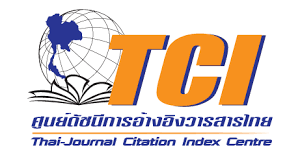การเปรียบเทียบต้นทุนผลผลิตทางการเกษตร ความสามารถในการทำกำไรและจุดคุ้มทุนของการปลูกผักเกษตรเคมี เกษตรปลอดสารพิษ และเกษตรอินทรีย์
คำสำคัญ:
ต้นทุนผลผลิตทางการเกษตร, ความสามารถในการทำกำไร, จุดคุ้มทุน, บริหารต้นทุนบทคัดย่อ
งานวิจัยนี้มีวัตถุประสงค์เพื่อค้นหาและเปรียบเทียบต้นทุนผลผลิตทางการเกษตร ความสามารถในการทำกำไร และจุดคุ้มทุนของผักที่ปลูกด้วยวิธีเกษตรเคมี เกษตรปลอดสารพิษ และเกษตรอินทรีย์ เก็บข้อมูลปฐมภูมิด้วยการสัมภาษณ์เชิงลึกกึ่งมีโครงสร้างและการสังเกตกับเกษตรกรที่ปลูกผักหลายชนิดประกอบด้วย ผักกาดหอม ปวยเล้ง และคะน้า ที่จังหวัดกาญจนบุรี และจังหวัดนครปฐม ผลการวิจัยพบว่าต้นทุนผลผลิตทางการเกษตรต่อไร่ของผักที่ปลูกด้วยวิธีเกษตรเคมี เกษตรปลอดสารพิษ และเกษตรอินทรีย์ เท่ากับ 13,290.56 บาท 43,094.00 บาท และ 79,233.91 บาท ตามลำดับ อัตราส่วนรวมต้นทุนผลผลิตทางการเกษตรต่อรายได้จากการขายผักที่ปลูกด้วยวิธีเกษตรเคมี เกษตรปลอดสารพิษ และเกษตรอินทรีย์ เท่ากับ 3.164 %, 8.265 % และ 8.666 % ตามลำดับ อัตราส่วนกำไรสุทธิต่อรายได้จากการขายผักที่ปลูกด้วยวิธีเกษตรเคมี เกษตรปลอดสารพิษ และเกษตรอินทรีย์ เท่ากับ 96.836 %, 91.735 % และ 91.334% ตามลำดับ จุดคุ้มทุนต่อไร่ของผักที่ปลูกด้วยวิธีเกษตรเคมี เกษตรปลอดสารพิษ และเกษตรอินทรีย์ เท่ากับ 0.008643, 0.053020 และ 0.071340 ตามลำดับ เพื่อเพิ่มความสามารถในการทำกำไรและลดจุดคุ้มทุนเกษตรกรไทยที่ปลูกผักด้วยวิธีเกษตรปลอดสารพิษและเกษตรอินทรีย์จำเป็นต้องลดและควบคุมต้นทุนผลผลิตทางการเกษตร
เอกสารอ้างอิง
กระทรวงเกษตรและสหกรณ์. (2559). ๙ หลักวิชาการ เพื่อลดต้นทุนและสร้างมูลค่าเพิ่มในการผลิตพืช สำนักวิจัยและพัฒนาการเกษตรเขตที่ ๘ กรมวิชาการเกษตร. สืบค้นเมื่อ 8 สิงหาคม 2563, จาก https://kb.psu.ac.th/psukb/bitstream/2016/15617/1
กระทรวงเกษตรและสหกรณ์. (2563). การจัดการความรู้ เทคโนโลยีการใช้ปุ๋ยชีวภาพเพื่อเพิ่มประสิทธิภาพการผลิตพืชในเขตภาคกลางและภาคตะวันตก สำนักวิจัยและพัฒนาการเกษตรเขต 5 กรมวิชาการเกษตร. สืบค้นเมื่อ 8 สิงหาคม 2563, จาก https://www.doa.go.th/share/showthread.php? tid=24441
กระทรวงเกษตรและสหกรณ์. (2565). มาตรฐานสินค้าเกษตร มกษ. 9000-2564 สำนักมาตรฐานสินค้าเกษตรและอาหารแห่งชาติ. สืบค้นเมื่อ 8 สิงหาคม 2563, จาก https://tas2go.acfs.go.th
กระทรวงสาธารณสุข. (2560). ประกาศกระทรวงสาธารณสุข เลขที่ 387 พ.ศ. 2560 เรื่องอาหารที่มีพิษตกค้าง. สืบค้นเมื่อ 8 สิงหาคม 2563, จาก https://dl.parliament.go.th
ขวัญชนก ห่านนิมิตกุลชัย, นุชจรินทร์ โลหะปาน และ สายนที วงศ์คำดี. (2561). แนวทางการบริหารบัญชีเกษตรอินทรีย์สู่ความสาเร็จ กรณีศึกษา สวนจารุวรรณ. วารสารศิลปศาสตร์และวิทยาการจัดการ, 5(2), 33-45.
นิตยา โพธิ์ศรีจันทร์ และ ศิริวรรณ เพชรไพร. (2565). ผลกระทบของการประยุกต์ใช้ข้อมูลการบัญชีบริหารเชิงรุกที่มีต่อประสิทธิภาพการดำเนินงานของธุรกิจขนาดกลางและขนาดย่อมในจังหวัดนครพนม. วารสารศิลปศาสตร์และวิทยาการจัดการ, 9(1), 19-30.
วรรณี เตโชโยธิน และ ชุติมณฑน์ เจริญกิจจาธร. (2563). การศึกษาผลตอบแทนทางเศรษฐกิจเชิงเปรียบเทียบของการเพาะปลูกข้าวแบบเกษตรอินทรีย์และเกษตรดั้งเดิมโดยใช้วิธีต้นทุนวงจรอายุ. วารสารวิชาชีพบัญชี, 16 (51), 23-39.
สมาคมนักบัญชีและผู้สอบบัญชีรับอนุญาตแห่งประเทศไทย. (2538). ศัพท์บัญชี. กรุงเทพมหานครฯ: บริษัท พี.เอ.ลิฟวิ่ง จำกัด.
สุภางค์ จันทวานิช. (2553). วิธีวิจัยเชิงคุณภาพ. กรุงเทพมหานครฯ: สำนักพิมพ์แห่งจุฬาลงกรณ์มหาวิทยาลัย.
Aslam, W., & Hong, C. (2018). Comparative Profitability Analysis of Conventional and Organic Vegetable Farming in Khyber Pakhtunkhwa and Azad Jammu Kahsmir, Pakistan. Journal of Economics and Sustainable Development, 9 (8), 46-51.
Choy, A. E., Ahmad, H., & Manaf, A. A. (2021). Comparative cost benefit analysis of conventional farming and agroecological farming for paddy cultivation in Bachok, Kelantan. International Journal of Environmental Science and Development, 12 (6), 181-187.
Cooper, J., & Dobson, H. (2007). The benefits of pesticides to mankind and the environment. Crop Protection, 26, 1337-1348.
Gibbon, P., & Bolwig, S. (2007). The economics of certified organic farming in tropical Africa: a preliminary assessment. Danish Institute of International Studies (Working Paper 3, January 2007), Copenhagen, Denmark.
Hedlund, J., Longo, S., & York, R. (2019). Agriculture, pesticide use, and economic development: global examination (1990-2014). Rural Social, 85, 519-544.
Janjhua, Y., Chaudhary, R., Deopa, V., & Kumar, K. (2018). A study on perceived problems and farmers’ attitude towards organic farming. International Journal of Farm Sciences, 8, 1–4.
Jintana, K., & Fujimoto, A. (2009). Sustainability assessment of organic vegetable cultivation in Chiang Mai, Thailand. Tokyo. Tokyo University of Agriculture.
Khoy, R., Nanseki, T., & Chomei, Y. (2017). Farmers’ perceptions of organic rice farming in Cambodia: opportunities and challenges. International Journal of Humanities and Social Science, 7, 92–103.
Lapple, D., & Kelly, H. (2010). Understanding farmers’ uptake of organic farming: an application of the theory of planned behavior. Proceeding of the 84th Annual Conference of the Agricultural Economics Society, Edinburgh, 29.
Lepcha, N., Mankeb, P., & Suwanmaneepong, S. (2021). Productivity and profitability of organic and conventional potato (Solanum tuberosum L.) production in West-Central Bhutan. Open Agriculture, 6, 640-
Mugivhisa, L.L., Olowoyo, J. O., & Mzimba, D. (2017). Perceptions on organic farming and selected organic fertilizers by subsistence farmers in Ga-Rankuwa, Pretoria, South Africa. African Journal of Science, Technology, Innovation and Development, 9 (1), 85–91.
Ndungu, S. K., Macharia, I. M., Kahuthia-Gathu, R., & Wahome, R. G. (2013). Impact of Organic Vegetable Production System in Kiambu and Kajiado Counties of Kanya. Journal of Environmental Science and Engineering A, 2, 256-266.
Ngowi, A.V.F., Mbise, T.J., Ijani, A.S.M., London, L., & Ajayi, O.C. (2007). Smallholder vegetable farmer in Northern Tanzania: Pesticides use practices, perceptions, cost and health effects. Crop Protection, 26, 1617-1624.
Oyedele, G.T., Wole-Alo, F.I., Owolabi, K.E., & Okunlola, J.O. (2018). Small–scale farmers perception on organic farming status in Ondo State, Nigeria. American Journal of Agriculture and Forestry, 6, 186–190.
Paneerselvam, P., Halberg, N., Vaarst, M., & Hermansen, J. E. (2012). Indian farmers’ experience with and perceptions of organic farming. Renewable Agriculture and Food Systems, 27, 157–169.
Panseri, S., Chiesa, L., & Ghisleni, G. (2019). Persistent organic pollutants in fish: biomonitoring cocktail effect with implications for food safety. Food Addit Contam A, 36, 601-611.
Patel, C.D. (2017). Awareness and attitude of organic farming followers of South Gujarat. Unpublished Master Thesis, Navsari Agricultural University, Extension Education Dept., N. M. College of Agriculture.
Pedersen, A.B., & Nielsen, HØ. (2017). Effectiveness of pesticide policies: experiences from Danish pesticide regulation 1986-2015. In M. Coll & E. Wajnberg (Eds). Environmental Pest Management, pp. (297-324). Chichester, UK: John Wiley & Sons, Ltd.
Pietrzak, D., Kania, J., Malina, G., Kmiecik, E., & Wator, K. (2019). Pesticides from the EU First Second Watch Lists in the Water Environment. CLEAN Soil Air Water: A Journal of Sustainability and Environmental Safety, 47 (7), 1800376.1-1800376.13, https//doi.org/10.1002/clen.201800376.
Sánchez-Bayo., F., & Wyckhuys, K.A.G. (2019). Worldwide decline of the entomofauna: a review of its drivers, Biological Conservation, 232, 8-27.
Shams, A., Hooshmandan, Z., & Fard, M. (2017). Factors affecting wheat farmers’ attitudes toward organic farming. Polish Journal of Environmental Studies, 26, 2207–2214.
Surekha, K.K., Rao, V., & Viraktamath, B.C. (2011). Organic farming: A success story from “Enabavi Village” in Andhra Pradesh. Organic Farming Newsletter, 7, 7–9.
Xu, Q., Hu, K., Zhang, H., Han, H., & Li, J. (2020). Organic Vegetable Cultivation Reduces Resource and Environmental Costs While Increasing Farmers’ Income in the North China Plain. Agronomy, 10, 361; doi: 10.3390/agronomy10030361.






